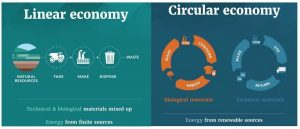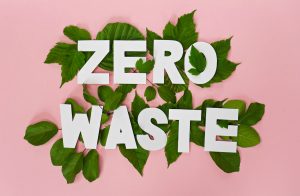The Core Basics
A circular economy is an economic system aimed at eliminating waste because it involves continual use of resources.
In practice, it implies reducing waste to a minimum. When a product reaches the end of its life, its materials are kept within the economy wherever possible. These can be productively used again and again.
Don’t we already do this?
No.
In nature, resources are reused so nothing goes to waste, but people create waste. The global economy currently follows a linear economic system based on a take-make-consume-throw away pattern. The linear model relies on large quantities of cheap, easily accessible materials, including natural resources like wood, metals, oil, in addition to energy.
While there are efforts to recapture material waste through recycling, products are not designed to be efficiently recycled, reused or composted, and existing recycling methods are not optimal.
The circular economy follows the 3R approach: Reduce, Reuse, Recycle
How can we promote a circular economy without plastic waste?
1. Reduce plastic waste. Watch our animated infographic, 9 Ways You Can Reduce Plastic Pollution. Watch S.T.O.P. – Stop The Ocean Pollution, our new stop-motion film with tips. Replace single-use plastic products, like bottles, bags, straws, etc., with reusable items. Buy products that can be used often, and if they must be thrown away, ensure they are recyclable.
2. Inform and inspire others to support a circular economy to help end plastic pollution. Education and research are critical to spread and share knowledge with your communities. Education and innovation are critical to achieve a circular economy, including new and improved technology, design, market incentives, and local, regional and international legislation and regulations.
3. Conduct advocacy for legislation, rules and regulations to achieve a circular economy. This will foster further innovation, and producer and supply chain incentives.
For example, people want to reduce their plastic consumption, but it can seem impossible when food, drink, medicine, etc. is excessively packaged with single-use plastic. Companies need requirements and incentives to change plastic packaging process, system and supply then their system. Thus, new laws and policies must be passed and implemented to incentivize and require companies to replace plastic packaging with either a sustainable option that is either recyclable, reusable or compostable, or composted of better packaging materials.
California is leading an unprecedented effort to pass new laws that reduce waste from single-use plastic packaging and products, ensure essential plastic is designed efficiently and effectively for reuse, recycling or compost; and implement effective plastic waste management.
Known as the California Circular Economy and Plastic Pollution Prevention Act, the legislation will come up for a vote in early January – Senate Bill 54 (SB-54) and Assembly Bill 1080 (AB-1080). If passed, the law will:
- Require all single-use plastic packaging and products sold or distributed in California to be reduced or recycled by 75% by 2030;
- Require all single-use packaging and products to be recyclable or compostable on and after 2030; and
- CalRecycle would develop incentives and policies to encourage in-state manufacturing using recycled material generated in California.
 The Good News? We are starting to see changes that support the transition to a circular economy.
The Good News? We are starting to see changes that support the transition to a circular economy.
The measures include:
- Market incentives:
- Government legislation: California will vote in early January on legislation to reduce single-use plastic waste and packaging and improve waste management. Learn about the Act on Plastic campaign to support the California Circular Economy and Plastic Pollution Prevention Act.
- Corporate policy: An increasing number of companies continue to recognize the responsibility to help end plastic pollution and implement corporate policies
- International cooperation. More than 180 governments came to a United Nations agreement to regulate hazardous chemicals and waste, including plastic waste. Learn about the UN agreement.
- Education, awareness initiatives and innovation: Watch engaging films and digital content to get informed and inspired: Plastic Oceans film library.


 The Good News? We are starting to see changes that support the transition to a circular economy.
The Good News? We are starting to see changes that support the transition to a circular economy.